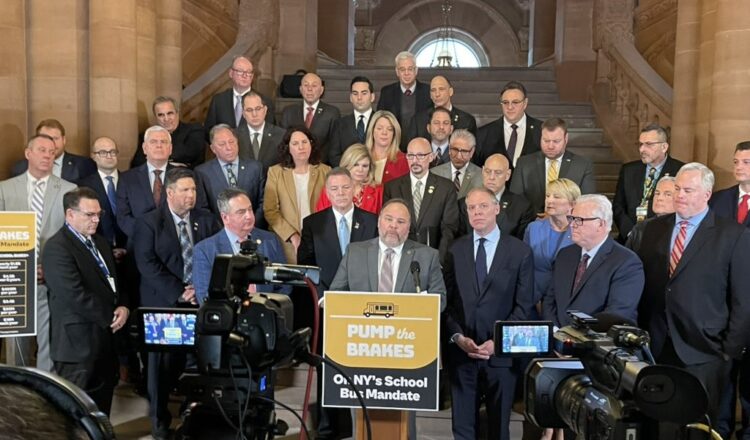Recent reports of cold weather failures and poor reliability add to concerns surrounding mandate and the costs that would fall on schools, property taxpayers
WATCH: Senator Tom O’Mara reaction
From the Offices of Senator Tom O’Mara, Senator George Borrello, Assemblyman Phil Palmesano
Albany, N.Y., February 12, 2024—State Senator Tom O’Mara today joined Assemblyman Phil Palmesano, Senator George Borrello, Horseheads School District Superintendent Tom Douglas, Republican colleagues in the state Senate and Assembly, and statewide school district representatives to propose legislation and call on Governor Hochul and the Legislature’s Democrat majorities to rescind the electric school bus mandate currently set to start taking effect in 2027.
The electric school bus mandate, enacted by Hochul and the Legislature’s all-Democrat majorities in 2022, requires new school buses purchased by local school districts to be all-electric by 2027 and all school buses in operation statewide to be electric by 2035. There is no provision made for geographical disparities, diverse weather conditions, or unique travel demands of the state’s school districts. In addition, this is another mandate from Albany that burdens cash-strapped school districts and local property taxpayers.
O’Mara and Palmesano have introduced legislation (S8220/A8447) that, among other provisions, would delay the mandate’s implementation until at least 2045 and require additional cost-benefit and safety analyses before it can take effect.
Borrello has introduced legislation (S8467) to rescind the mandate and replace it with a state-funded pilot program that would allow schools to test how these buses perform in a range of transportation responsibilities.
O’Mara said, “Many of us believe that the Albany Democrats’ current plan for imposing far-reaching renewable energy mandates on all New Yorkers is not feasible, affordable, or reliable. This is particularly true for local school districts being mandated to transition to all-electric school buses beginning in 2027. The current timeline raises far too many troubling questions on affordability, as well as surrounding reliability and safety for student transportation. We know that the existing plan comes with an enormous price tag for local schools. For already overburdened local property taxpayers, it’s emerging as yet another hard hit from yet another unfunded state mandate out of Albany. We are moving too far, too fast on this transition.
O’Mara continued, “The technology is simply not there yet. The electric grid can’t support it and the necessary charging equipment and buses which are not produced in sufficient quantities will get less expensive as the industry advances from its infancy. Further, urban settings where this may be more feasible, and where congestion and emissions are greater, should be going first. It seems reasonable and fair to reassess and reexamine the current timeline and its potential impact on school districts, students and families, and local communities.”
Palmesano said, “The consequences seem to get worse by the day while the Albany Democrats keep rushing to implement unreasonable and unworkable energy mandates on all of New York state’s citizens, businesses, communities, manufacturers, farmers, schools and others. This is especially true for local school districts, local economies and local property taxpayers if Gov. Hochul keeps pushing to meet the current timeline to transition to all-electric school bus fleets. School districts are facing one of the most expensive mandates they have ever faced. This state is forcing school districts to move, at breakneck speed, to implement a misguided, politically driven climate policy that the state itself has no idea if it is affordable, feasible or reliable. If we do not revise this timeline and significantly delay the implementation of the current mandate until we have more information, the benefit of experience and more efficient and less expensive technology, we are putting our schools, students and their families at serious risk and we are breaking the backs of local property taxpayers across this state at the worst possible time. We need to put a stop to this madness and reassess and reexamine this policy with common sense, expertise and a full cost-benefit, feasibility, and safety analysis.”
Borrello said, “As New York’s electric bus mandate’s 2027 implementation date approaches, school officials in my district and around the state are becoming increasingly concerned about the tremendous financial and operational challenges associated with this one-size-fits-all requirement. This mandated conversion will have a price tag in the billions, with New York State taxpayers simply expected to foot the bill. What is less clear is whether electric buses are capable of meeting the full range of school transportation demands, particularly in rural and suburban districts. With a traveling range of approximately 100 miles, they will not be able to transport students on field trips and to athletic competitions. That is just one problem that Democrats seem content to overlook. School administrators don’t have that luxury.”

Dr. Thomas J. Douglas, Superintendent of Horseheads Central School District, said, “Superintendents across the state are not against electric busing, a well-intentioned initiative. However, this initiative is one of the biggest unfunded mandates for schools passed on by the governor and PSC. Districts across the state need an immediate pause of this initiative because of the projected costs and timeline as well as the failure of this technology to meet the demands of school districts’ daily transportation and athletic/extracurricular needs. In Horseheads, we have more than 80 daily bus runs in both the a.m. and p.m. hours. From our initial review, a dozen of those runs simply cannot be executed with electronic busing. This number increases substantially as the weather turns colder. In addition, school districts will have to construct their own power substations within transportation centers to handle the new electrical demands of EV busing. Buses will also cost at least four times as much as our current buses and may also need batteries replaced prior to the vehicles’ end of service life at a cost of $150,000 plus per vehicle. In Horseheads, this will likely amount to asking our residents to approve annual bus propositions of more than $4.5 million per year, when currently these propositions are roughly $1.7 million for the same number of buses, and that is without the additional battery costs. This substantial increase also does not include the construction of the power substation, the high-end chargers needed to run these buses daily and for emergencies, as well as all the additional supporting construction technology needed to utilize EV buses. The total cost will ultimately be borne by the local tax base since this is really an unfunded mandate. The sad fact is that there is no guarantee that this technology will work predictably in Northeastern winters. All the governor and PSC need do is look to the Midwest this past winter to see electric vehicles and chargers not being able to run in frigid temperatures. We cannot risk that with our children. Put simply, the state must pump the brakes on electric busing.”
Legislators and school district representatives at today’s news conference cited numerous problems associated with electric vehicles that are gaining increasing attention, including their:
n Inability to operate or charge in frigid temperatures, as a well-publicized incident in Chicago in mid-January underscored. Designed to operate best in 70-degree temperatures, electric vehicles lose up to 40 percent of their traveling range in extreme cold and the time required to charge them is much longer. A pilot program in Vermont found traveling range decreased by 80 percent in some instances;
n Poor reliability. School districts engaged in pilot programs and agencies operating municipal buses have reported many electric buses are “gathering dust” in bus garages as a result of numerous mechanical problems and hard to access parts and technical support. A study by Consumer Reports found that electric vehicles have 80 percent more problems than conventional vehicles; and
n Exorbitant costs. Electric buses cost up to three times as much as conventional buses — it’s a difference of $130,000 versus $400,000 or more. Additionally, schools would be required to undertake significant electrical infrastructure and distribution line upgrades, as well as address major workforce transitions. The cost of the conversion has been conservatively estimated at between $8 billion and $15.25 billion more than the cost of replacing them with new diesel buses. The state allocated just $500 million in the most recent Environmental Bond Act to assist schools with the costs.
The legislation sponsored by O’Mara and Palmesano (S8220/A8447) would delay the mandate on school districts until 2045 or until all state agencies convert their fleets. Additionally, the legislation would:
n authorize the state Commissioner of Education, in consultation with the New York Independent Systems Operator (NYISO), utilities, and the state Department of Public Service, to override the mandate if it is determined that zero-emission school buses are not feasible for a particular application;
n require all components and parts used or supplied in zero-emission school buses or related infrastructure be made in whole or substantial part in the United States;
n direct the state Commissioner of Education to complete a cost-benefit analysis for each school district that considers the costs necessary to comply with the zero-emission school bus mandate; and
n direct the New York State Energy and Research Development Authority (NYSERDA) to consult with the state Office of Fire Prevention and Control to develop appropriate fire suppression and safety procedures related to lithium and hydrogen-based fires which NYSERDA must transmit to school districts as part of the technical assistance requirements of the zero-emission school bus mandate.
The legislation sponsored by Borrello (S8467) would rescind the mandate and replace it with a state-funded pilot program that would allow schools to test how these buses perform in a range of transportation responsibilities. A condition of the pilot program is that buses be sited in all three types of settings — rural, urban and suburban — so that their performance can be evaluated. At the end of one year, a report on the program would be presented to the executive and legislature.
Watch a replay of today’s full news conference at the Capitol on O’Mara’s Facebook page: @SenatorTomOMara






